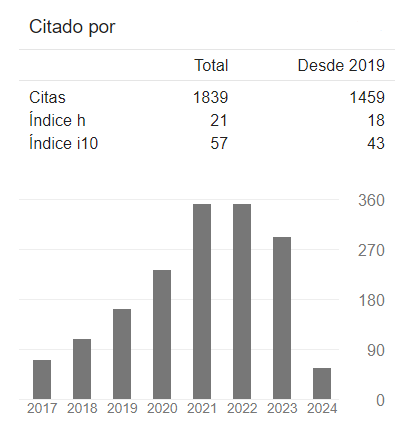Emotions and their influence on decision making – selected issues
DOI:
https://doi.org/10.24142/raju.v18n37a7Keywords:
emotions, decision making, law, case-study, criminal lawAbstract
The aim of this article is to present the correlation between deci- sion-making and the influence of emotions on this process. It is rele- vant both to the everyday situations as well as to the law. That’s why in the work it will be presented the results of own research related to decision-making by lawyers and persons practicing a profession other than law in the field of criminal law on the basis of a prepared research case will be presented. The research was conducted using research method survey.
References
American Psychological Association (APA). (2023a). Decision making, APA Dictionary of Psychology. https://dictionary.apa.org/decision-making
American Psychological Association (APA). (2023b). Emotion, APA Dictionary of Psychology. https://dictionary.apa.org/emotions.
Baron, J. (2012). The point of normative models in judgment and decision making. Front. Psychology, (3), 577. https://www.frontiersin.org/articles/10.3389/fpsyg.2012.00577/full.
Cohn, M. A., Fredrickson, B. L., Brown, S. L., Mikels, J. A. y Conway, A. M. (2009). Happiness unpacked: Positive emotions increase life satisfaction by building resilience. Emotion, 9(3), 361-368 https://www.ncbi.nlm.nih.gov/pmc/articles/PMC3126102/.
Côté-Lussier, C. y David, J.-D. (2023). Intuitive anger in the context of crime and punishment. Psychology, Crime & Law, 29(5), 465-487. https:// www.tandfonline.com/doi/abs/10.1080/1068316X.2022.2027946.
Critchley, P. (2018). Autonomy, authenticity and authority: The rational freedom of Jean-Jacques Rousseau. Humanities commons. Based on commons in a BOX. https://hcommons.org/deposits/item/hc:19891/.
D?browski, A. (2015). Emotions and decision-making processes. En A. D?browski, A. Schumann y J. Wole?ski (Eds.), Decision making-concepts, theories, controversies, Kraków (pp. 235-261). https://www.academia.edu/36167745/Emocje_a_procesy_decyzyjne.
Fredrickson, B. L. (2002). Positive emotions. En S. López, C. R. Snyder, L. Edwards y S. Marques (Eds.), The Oxford handbook of positive psychology (pp. 120-134). Oxford University Press.
Ga?uszka, A. (2022). Emotion-their meaning and tasks. Journal of Education, Health and Sport, 12(1), 147-159.
Gu, S., Wang, F., Patel, N. P., Bourgeois, J. A. Y Huang, J. H. (2019). A model for basic emotions using observations of behavior in Drosophila. Frontiers in Psychologia, (10), 781.
Holska, A. M. (2016). Theories of decision-making. En K. Krzysztof (Ed.), Management, organizations and organizing. A review of theoretical perspectives. Warsaw.
Keltner, D., Oatley, K. y Jenkins, J. (2014). Understand emotions. John Wiley & Sons. https://vdoc.pub/documents/understanding-emotions-7jba5ueeimt0.
?abuz, A. (2019). The decision-making process on the example of the purchase of new computer equipment. Studies and Works, (59), 119-130. https://wnus.usz.edu.pl/sip/en/issues/.
LeDoux, J. E. (1998). The emotional brain. The mysterious underpinnings of emotional life. Simon & Schuster.
Lerner, J., Li, Y., Valdesolo, P. y Kassam, K. (2015). Emotion and decision making. Annual Review of Psychology, 66, 799-823.
Mayer, J. D., Caruso, D. R. y Salovey, P. (2016). The ability model of emotional intelligence: Principles and updates. Emotion Review, 8(4), 290-300. https://doi.org/10.1177/1754073916639667.
Newell, A. y Simon, H. A. (1972). Human problem solving. Prentice-Hall. https://learnlab.org/wiki/images/1/1d/Human_Problem_Solving. pdf.
Paternoster, R., Jaynes, C. M. y Wilson, T. (2017). Rational choice theory and interest in the “Fortune of Others”. Journal of Research in Crime and Delinquency, 54(6), 847-868. https://ccjs.umd.edu/sites/ccjs.umd.edu/files/pubs/1compliant-Rational%20Choice%2C%20Paternoster.pdf o https://doi.org/10.1177/0022427817707240.
Plutchik R., (1970). Emotions, evolution, and adaptive processes. En
M. B. Arnold (Ed.), Feelings and emotions. The Loyola Symposium (pp. 3-24). Academic Press. https://shop.elsevier.com/books/feelings-and-emotions/arnold/978-0-12-063550-4.
Quigley, B. M. y Tedeschi, J. T. (1996). Mediating effects of blame attributions on feelings of anger. Personality and Social Psychology Bulletin, 22(12), 1280-1288. https://doi.org/10.1177/01461672962212008.
Reeve, J. (2009). Motivación y emoción. McGraw-Hill/Interamericana Editores. https://clea.edu.mx/biblioteca/files/original/22488921e36d90caeef3d8973d805dcb.pdf.
Samuelson W. F. y Marks S. G., (2012). Managerial economics. John Wiley & Sons. http://www.mim.ac.mw/books/Samuelson%20Managerial%20Economics%207e.pdf.
Schwarz, N. (1990). Feelings as information: Informational and motivational functions of affective states. En E. T. Higgins y R. M. Sorrentino (Eds.), Handbook of motivation and cognition: Foundations of social behavior (vol. 2, pp. 527–561). The Guilford Press.
Sirois, B. C. y Burg, M. M. (2003). Negative emotion and coronary heart disease: A review. Behavior Modification, 27(1), 83-102. https://pubmed.ncbi.nlm.nih.gov/12587262/.
Verweij, M., Senior, T. J., Domínguez, D. Y Turner, R. (2015). Emotion, rationality, and decision-making: How to link affective and social neuroscience with social theory. Frontiers in Neuroscience, 9, 332. 10.3389/fnins.2015.00332. https://www.frontiersin.org/articles/10.3389/fnins.2015.00332/full.
Published
How to Cite
Issue
Section
License
Copyright (c) 2023 Katarzyna Witek-Mioduszewska

This work is licensed under a Creative Commons Attribution-NonCommercial-ShareAlike 4.0 International License.
La rivista consente all'autore (s) di mantenere i diritti di pubblicazione senza restrizioni.
Le journal permet à l'auteur (s) de conserver les droits de publication sans restrictions.
The journal allows the author (s) to retain publication rights without restrictions.
La revista le permite al autor(es) retener los derechos de publicación sin restricciones
Die Zeitschrift ermöglicht es dem / den Autor (en), Veröffentlichungsrechte ohne Einschränkungen zu behalten.
A revista permite que os autores mantenham os direitos de publicação sem restrições.











































